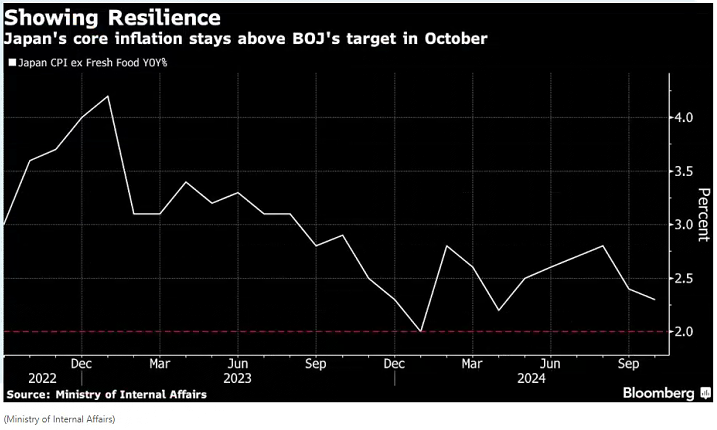Japan's inflation remains above the central bank's target level, and it is expected to raise interest rates in December or January next year
Despite a slight slowdown in price increases, Japan's main inflation indicators remain above the central bank's target level. The data largely supports the central bank's view that underlying inflation remains stable.
The Japanese Ministry of Internal Affairs announced on Friday (November 22) that the CPI for October, excluding fresh food, increased by 2.3% year-on-year, lower than September's 2.4% but higher than the general expectation of 2.2%. An index that does not include energy costs and fresh food prices increased by 2.3%, higher than the previous 2.1%.

Figure: Showing resilience (Japan's core inflation remained above the central bank's target level in October) (white line refers to Japan's year-on-year CPI excluding fresh food)
As predicted by most surveyed economists, Friday's data may prompt the central bank to raise interest rates in the coming months, further normalizing its policy setting.
Takeshi Minami, an economist at Norinchukin Research Institute in Japan, said, "Apart from factors such as electricity and natural gas, inflation remains strong. This is partly due to rising import commodity prices and average consumption, but inflation remains strong. I believe the Bank of Japan will raise interest rates again in December
The slowdown in price growth is mainly due to the government's intermittent measures to offset inflationary pressures with financial assistance. The cancellation of government subsidies last year pushed up the index at that time.
In October, the increase in electricity costs slowed down from 15.2% in September to 4%, and the increase in natural gas prices also slowed down. The subsidy for public utilities will lower the overall index by 0.54%.
On the other hand, processed food prices rose by 3.8%, higher than the 3.1% in September. A report from Teikoku Data Bank in Japan shows that food companies raised prices for 2911 types of food in October, marking the beginning of the second half of the fiscal year. The price of rice has increased by 60%.
The momentum of basic prices remains stable, with service price growth accelerating from 1.3% to 1.5%, further proving that inflation is becoming increasingly entrenched in the economy.
Although Bank of Japan Governor Kazuo Ueda has not given any clear signal on the possible timing of the next interest rate hike, many economists predict that the Bank of Japan will raise interest rates in December or January next year. The Bank of Japan will announce its next policy decision on December 19th.
Bloomberg Economics stated, "Service prices (the main focus of the Bank of Japan) have rebounded, reflecting adjustments made by businesses at the beginning of the second half of the fiscal year. Non fresh food prices are also a driving factor, with rice prices soaring and imported food costs rising. In summary, this report is in line with the Bank of Japan's view that the target level of 2% is becoming safer, and the depreciation of the yen is increasing the risk of overshoot.
Tips:This page came from Internet, which is not standing for FXCUE opinions of this website.
Statement:Contact us if the content violates the law or your rights
